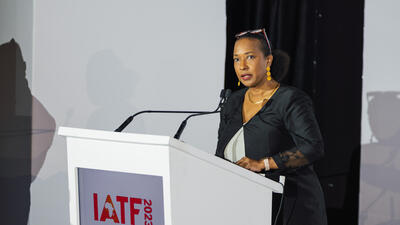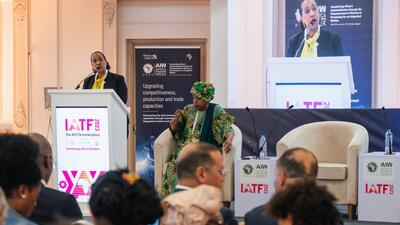
Raising the profile of women-led businesses in Africa
(Cairo, Egypt) Executive Director Pamela Coke-Hamilton delivered her welcoming remarks at the African Union’s African Women in Processing Initiative high-level event during the 2023 Intra-African Trade Fair.
Distinguished guests, ladies and gentlemen, good morning! I’m delighted to be here today as we kick off both the Africa Industrialisation Week and the second summit of the African Women in Processing Initiative. And it’s especially apt that these two events are happening together, as we know that women-led processing businesses are key for moving Africa’s industrialization into hyper drive.
Last November, I was able to take part in the first-ever African Women in Processing Summit in Niamey. The achievements since then have shown us what a difference a year can make, so long as you have dedicated partners working to raise the profile of women-led businesses. I would like to congratulate the African Union Commission and the AU’s African Women in Processing Initiative for their work in keeping the role of women in Africa’s industrialization at the top of the agenda.
The International Trade Centre is a joint agency of the United Nations and the World Trade Organization, and for nearly 60 years, we’ve been working with small and medium-sized businesses around the world as they engage in international trade and reap the benefits it has to offer.
Those 60 years have taught us that inclusion matters: if we’re going to deliver on ambitious goals such as the African Union’s Agenda 2063, we need women to play a major part in economic growth and transformation, including in trade and industrialization.
That’s why I’m particularly excited for today’s launch of the Continental Network for Women’s Business Associations in Africa, which counts over 100 women’s business associations as members. I’m very thankful to the African Union Commission and the African Women in Processing Pavilion for providing the platform to make this launch possible, and hope to see many of you there at 11 AM.
Today, I want to share three lessons that we’ve learned at ITC about trade, industrialization, and the role of women-led processing businesses.
First, we can only achieve the economic transformation promised by regional integration initiatives if women-led MSMEs are in the driver’s seat. Our One Trade Africa program was designed with this in mind: with the African Continental Free Trade Area bringing together a market worth $3.4 trillion, we’ve been working with women- and youth-led MSMEs to help them leverage this agreement’s full potential, while channelling their priorities back to policymakers.
These efforts take part in tandem with our SheTrades initiative, our flagship women and trade programme. For instance, through our project with FAO on “Empowering women and boosting livelihoods through agricultural trade: Leveraging the AfCFTA,” we are assessing the opportunities and constraints that women working in agricultural value chains, from producers to processors, face under this trade agreement. We are complementing this work with other initiatives where we provide technical assistance to women working in specific value chains like cashews, shea, and cassava, with the goal of supporting the livelihoods of 10,000 women.
Second, I want to talk about the role of partnerships. We’ve been working with local partners to set up SheTrades Hubs around the world, which are dedicated spaces for women-led businesses to network, access training and information, and benefit from investment opportunities. We now have 17 of them—including six in Africa—and they are already showing results. We’ve also been very fortunate to partner with the African Union Commission on helping empower more women- and youth-led MSMEs to take part in the regional economy through the AU MSME Strategy
Third, I want to talk about the policy environment we need so that women-led processing businesses can achieve their full potential, and why this policy environment must be paired with greater investments in industrialization.
We cannot realize the benefits of trade without looking at industrial policy, and we cannot achieve industrialization without understanding how trade works. That’s why we need policymakers to craft solutions that look at the big picture and this is why I commend the decision to integrate the AWIP Summit within the Africa Industrialisation Week architecture.
What does investing in industrialization mean? We need to invest in developing skills and capacity. We need to invest in infrastructure. We need greater diversity in African small businesses’ exports, including processing businesses. We need to promote strategic new industries where Africa’s women-led processing businesses can have a competitive, and comparative, advantage. And we need to achieve economies of scale through greater regional integration and improving market access.
Africa still accounts for only a meagre share of global trade—barely over 2%—and without investing in industrialization, even the best-meant efforts at integrating African processing businesses, especially those led by women, into international supply chains will fail to achieve their full potential.
We hope to see many of you at our market access capacity-building workshop at the AWIP Pavilion this week. We’re also grateful to the African Union Commission for inviting us to join the first meeting of the Interim Steering Committee of the AWIP this past March, and we’re excited to continue working with you on the initiative’s next steps in its second year.
Thank you all and I wish you a productive conversation.





